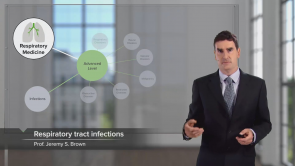Postpartum Psychiatric Disorders

Über den Vortrag
Der Vortrag „Postpartum Psychiatric Disorders“ von Veronica Gillispie, MD, MAS, FACOG ist Bestandteil des Kurses „Year 3 – Obstetrics/Gynecology“. Der Vortrag ist dabei in folgende Kapitel unterteilt:
- Psychiatric Disorders in Pregnancy
- Summery of Psychiatric Disorders in Pregnancy
Quiz zum Vortrag
An 18-year-old female with a past medical history of depression when she was 15, presents for a 2 week follow up after an emergency cesarean section. On exam, she is weepy and disheveled. She reports her baby has been in the NICU since delivery, and since her hospital discharge 1 week ago, she hasn't visited the baby but figures he is fine with the nurses' care. She lives with a roommate, is not in contact with the father of the baby, and doesn't have family support at this time. She denies suicidal ideation, but does feel hopeless and overwhelmed most days. In addition to starting an SSRI, what should you do for this patient's treatment?
- Start psychotherapy
- Send to emergency room for immediate hospitalization
- Refer case to child protective services
- Start antipsychotic medication
- Attempt to contact the father of the baby for extra support
A 31-year-old woman just delivered her baby at 34 weeks gestation 5 days ago. Her baby boy is in the nursery for phototherapy to treat hyperbilirubinemia but is otherwise healthy. Although the mother was discharged from the hospital, she continues to visit daily to breastfeed her baby and pumps milk in between feedings for the baby to have overnight when she is away. She cries several times a day and especially at night time when she feels guilty that she can not be with her baby. She tells her husband that she is overwhelmed by the whole situation of delivering the baby earlier than anticipated and wishing she could have been more prepared. What is the most likely diagnosis for this patient?
- Postpartum blues
- Postpartum depression
- Postpartum anxiety
- Postpartum psychosis
- Normal state
How common is postpartum blues among women who have just delivered a baby within 2 weeks?
- 50-80%
- 15-25%
- 10-20%
- 1-5%
- Nearly all women experience postpartum blues
Which of the following increases the risk of postpartum depression?
- Having a baby with health problems
- Breastfeeding
- Financial prosperity
- Family history of hypertension
- Advanced maternal age
Which of the following symptoms defines postpartum psychosis?
- Visual and auditory hallucinations
- Suicidal ideation
- Feelings of guilt
- Feelings of hopelessness and inability to cope
- Feelings of complete detachment from her baby
What is the treatment for postpartum blues?
- Monitor for self-resolution
- SSRI
- Psychotherapy
- Combined SSRI and psychotherapy treatment
- Emergency room evaluation for hospitalization
Diese Kurse könnten Sie interessieren
Kundenrezensionen
5,0 von 5 Sternen
| 5 Sterne |
|
1 |
| 4 Sterne |
|
0 |
| 3 Sterne |
|
0 |
| 2 Sterne |
|
0 |
| 1 Stern |
|
0 |
great information the material was to the point ! great review




